Fly-tipping
Fly-tipping
Find out how we deal with fly-tipping and the enforcement actions we take.
- Overview
- Why fly-tipping is a problem
- Report fly-tipping
- Removal of fly-tipping
- Fly-tipping on private land
- Enforcement
- Investigations
- Help prevent fly-tipping
- Further information
Overview
Fly-tipping is the unauthorised dumping of solid or liquid waste on land or in water. It can be anything from a bag of rubbish, garden waste or an old mattress, to lorry loads of building waste, asbestos or drums of chemicals.
Fly-tipping is a crime, which carries serious penalties. In the Crown Court the maximum penalty is 5 years jail and/or an unlimited fine. In the magistrates’ court, persons convicted of fly-tipping can be fined an unlimited amount, jailed for 12 months, or sent to The Crown Court for more severe penalties. The legislation creating the offence is section 33 of the Environmental Protection Act 1990.
Vehicles used by fly-tippers can be seized by the police, the Environment Agency or a local authority, forfeited and crushed. The Council regularly takes enforcement actions for waste crime, including prosecutions, and it will seize vehicles that have been used for fly-tipping.
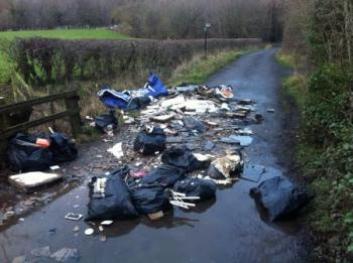
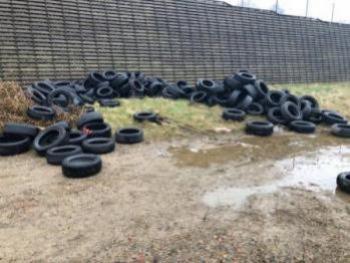
Why fly-tipping is a problem
The illegal disposal of waste:
- causes environmental harm
- is a risk to public health
- despoils the local environment
- reduces amenity value and affects communities
- may harm or injure wildlife, livestock and pets, and children attracted to it
- acts as a catalyst for further crime, including attracting more fly-tipping or arson, leading to a deterioration of the local environment and a reduction in public confidence in an area
In its more serious forms, illegally deposited waste can release pollution into the ground, groundwater, any nearby watercourses and into the air, and it can damage soil quality. This is particularly relevant if the waste is not cleared quickly and is allowed to decay, rain leaches substances from the waste, and/or the waste contains liquids or hazardous materials. It can also be set alight, generating numerous hazardous air pollutants.
Organised waste crime undermines our efforts to dispose of and recover waste responsibly and also the viability of legitimate waste management businesses. Illegal operators undercut those operating within the law; they avoid waste disposal costs, permit fees and taxes, and do not invest in new waste recovery technology.
If you employ someone who is an illegal operator, you can be prosecuted.
Report fly-tipping
Local authorities and the Environment Agency both have a responsibility to deal with illegally deposited waste. It is also a crime and police have the same powers as the environmental regulators to deal with fly-tippers.
Local authorities have a duty to remove fly-tipping from their own directly-managed land and the highways they maintain in their areas. They may decide to investigate these and can carry out a range of enforcement actions.
The Environment Agency is responsible for dealing with large-scale, serious and organised waste crime.
There are several ways you can report fly-tipping in Newcastle:
- Report online
- If you have details of the person or vehicle you have witnessed fly-tipping, please email us or telephone 0191 278 7878 and ask for 'environmental health'
- Telephone: for waste to be cleared, telephone: 0191 278 7878
- Textphone: 0191 211 4944
- Post: Civic Centre, Newcastle upon Tyne, NE1 8QH
If you witness fly-tipping in progress, and involving a vehicle, contact the police on 999 or 101 and give the details to the police contact handler. Ensure you explain that the offence is happening and give the police the exact location and the registration of the offender's vehicle.
Fly-tipping is a recordable crime and the offenders may be caught during or soon after the offence. Do not report fly-tipping to the police unless you witness it as a crime in progress or the fly-tip is blocking a road and is presenting a danger to traffic. After calling the police, please contact us with the police incident number and your own contact details.
If the waste appears to be of a hazardous nature or in or near a river or other watercourse, contact the Environment Agency's incident hotline on 0800 80 70 60 (24 hours).
The person taking your call will need to know as much information as possible, including:
- the location and the type of land
- the date and time the fly-tipping was seen, including the time the offence started and finished
- a description of the person(s) doing the fly-tipping (hair colour, height, build, distinguishing features, etc.)
- details of where you were at the time
- your name and contact details
- details of any other witnesses with you
- a description (make, colour, markings) and registration number of any vehicle involved, and
- the type and estimated quantity of the waste tipped
Do not put yourself in danger by handling the rubbish or confronting fly-tippers.
If possible, try to get photographic or video evidence, but you should only do this carefully and not put yourself at risk.
Removal of fly-tipping
Local authorities are responsible for arranging the removal of fly-tipping from land where all of the following apply:
- it is open to the air on at least one side
- it is under their direct control, and
- it is accessible to the public, with or without payment
along with:
- any highway the local authority is responsible for
Some roads are private and others are managed by Highways England.
Fly-tipping on private land
Please note local authorities (such as district, county and unitary councils) have to remove waste from their land as the owner of the land and/or because the law says so. Legislation defines what land local authorities must, by law, clear waste and litter from.
Local authorities are not responsible for clearing or collecting fly-tips on private land, which have to be dealt with by the landowner or the occupier of the land. The Council may be able to provide a quote for doing this work - please contact us on 0191 278 7878 and ask for 'Your Local Services.'
Land managers must ensure that they use an authorised waste carrier to remove any fly-tipped waste and they must also comply with the waste management duty of care.
When you pass the waste onto a waste carrier or to a waste management site you need to give them a written description of the waste. You must keep a copy of this for a minimum of 2 years. Additional rules apply if someone moves hazardous waste.
Further guidance is provided by HM Government on land managers' responsibilities and the duty of care. There are also rules on temporarily storing fly-tipped waste.
Our Environmental Protection team may decide to investigate incidents of fly-tipping on private land, if they are witnessed and there is a suspect, or if there is a risk of pollution from the waste. The responsibility for removing the waste remains with the landowner and compensation may be claimed via the criminal or civil courts.
In some circumstances the Council or the Environment Agency can require an occupier or owner of land to clear fly-tipping. Sections 59 and 59ZA of the Environmental Protection Act 1990 allows us to serve notice requiring an occupier of land or the owner to remove fly-tipped waste (i.e. brought to the land from elsewhere) and/or reduce the consequences of the fly-tip. There is a defence if the person served with the notice neither deposited nor caused or permitted the deposit of waste.
Occasionally deposits may be dealt with under the Anti-social Behaviour Crime and Policing Act 2014 or the Town and Country Planning Act 1990, where they are having a detrimental effect, of a persistent or continuing nature, on the quality of life of those in the locality, and the conduct of the owner or occupier is unreasonable.
It may be that fly-tipped waste is on private land significantly longer than it would be on Council land.
Enforcement
Newcastle City Council is committed to tackling all forms of waste crime. We use a range of powers to deal with fly-tipping, including prosecution, fixed penalty notices, enforcement notices, the seizing of vehicles, CCTV cameras and various investigatory techniques.
Fly-tipping is often associated with dumping waste from vehicles. The person who owns or is in a position to control the use of the vehicle can be prosecuted, which means that it is possible for a prosecution to occur when only the vehicle, not the driver, is identifiable.
In the past 11 financial years (up to March 2024) we have taken:
- 1,802prosecutions, and
- issued 2,250 fixed penalty notices for waste crimes
These actions have resulted in:
- 4,670hours of community payback
- 1,239 weeks’ in prison
- 90 days rehabilitation activity requirement, and
- over £783,977 paid in fines and penalties
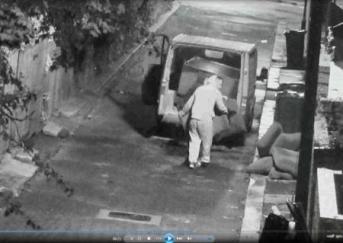
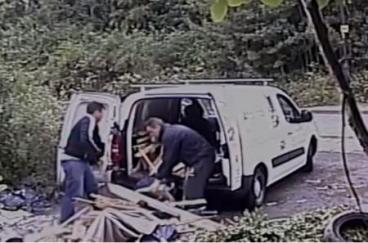
Since powers for local authorities to seize vehicles used in waste crime came into effect in April 2015 we have:
- seized 50 vehicles from fly-tippers and illegal waste carriers (as of October 2023), and
- sold or scrapped 26 of these vehicles
Details of vehicles seized by the Council, and the relevant legal notices, are published online.
Nationally, Newcastle City Council carries out some of the highest numbers of prosecutions for waste crime, such as fly-tipping.
In 2018/19, HM Government statistics showed we prosecuted the highest number of cases involving waste crimes. In the years 2013/14, 2014/15, 2015/16, 2016/17, 2017/18, 2019/20 and 2020/21, we prosecuted the second highest number of cases, and in 2021/22 we ranked fifth (out of 309 councils). In the most recent year of statistics, 2022/23, we ranked fourth.
In 2021/22, we carried out 55% of all the prosecutions in the North East, and secured all but one of the community sentences and the only custodial one. 91% of our waste-related fixed penalty notices were paid, against a regional average of only 11% and a national one of 14%.
In 2022/23, we carried out 6% of prosecutions nationally and 60% of those regionally. All of the 7 custodial sentences and half of the community sentences in the North East resulted from our prosecutions. One third of the custodial sentences nationally were imposed for offences prosecuted by us. 85% of waste-related fixed penalty notices were paid, while the regional average was 12% and the national average only 13%.
| 2022/23 | 100 |
| 2021/22 | 63 |
| 2020/21 | 61 |
| 2019/20 | 186 |
| 2018/19 | 241 |
| 2017/18 | 240 |
| 2016/17 | 182 |
| 2015/16 | 198 |
| 2014/15 | 194 |
| 2013/14 | 204 |
Fixed penalties
We use fixed penalties of between £250 and £700 but only for offences with low criminality. Any offences involving those engaged in the business of waste management or offences involving vehicles and/or dangerous waste, are referred to the magistrates' court or to the Crown Court. Magistrates and judges can impose unlimited fines for fly-tipping. The offence also carries up to five years in prison. We will always seek sanctions that are an appropriate punishment and also a deterrent. Out of court disposals such as fixed penalty notices are intended for low level, straightforward offences.
Press articles and sentencing outcomes
In line with our policy on publicising sentencing outcomes, we aim to promote our positive messages through the use of the media.
Citylife 14 March 2024
Citylife 4 October 2023
Chronicle 21 June 2023
Chronicle 8 June 2023
Citylife 24 April 2023
Citylife 27 February 2023
Citylife 26 August 2022
Northern Echo 27 January 2022
Citylife 21 January 2022
Citylife 27 April 2021
Citylife 22 October 2020
Chronicle 26 June 2020
Citylife 23 September 2019
Chronicle 30 July 2019
Chronicle 23 May 2019
Citylife 23 May 2019
Citylife 24 April 2019
Chronicle 8 March 2019
Chronicle 13 January 2019
Chronicle 8 December 2018
National statistics
Statistics on the number of fly-tipping incidents and actions taken in England and dealt with by local authorities can be found at: ENV24 - Fly tipping incidents and actions taken in England - GOV.UK (www.gov.uk)
Investigations
When fly-tipping is reported to us, we will assess the report and carry out a preliminary investigation based on:
- how serious the offence is and the harm caused, or the possibility of harm
- potential costs, and the
- likelihood of a successful prosecution
This might involve a review of:
- witness accounts and anything to corroborate them
- the scene
- evidence available and its reliability, e.g. CCTV footage
- local knowledge, and
- how the offence appears to have been committed and its likely motive
If we carry out a criminal investigation it will be in line with the Police and Criminal Evidence Act 1984 and the Codes of Practice. Surveillance will be in accordance with the Regulation of Investigatory Powers Act 2000 and Home Office guidance. Prosecutions follow the process set out in the Criminal Procedure Rules.
In some cases, we may need to interview the person reporting the offence in order to obtain additional details and a witness statement. We may be able to take a statement over the telephone. When we make contact we may need to see and take away any relevant documents or photographs so that we can refer to them in the statement.
Witnesses making statements will be informed of the outcome of investigations and will be given a named contact. We can only give limited information while an investigation is ongoing.
We may refer some incidents to the Environment Agency if it is large-scale, serious, organised illegal dumping, or immediately threatens human health or the environment. We work with the Environment Agency and neighbouring local authorities to deal with cross-border offenders. Some issues may be referred to the police, or the police may assist us with our investigations.
If the issue reported concerns a waste operation that can be brought within regulation, it will be referred by us to the Environment Agency. Unauthorised waste disposal operations may also be reported to HM Revenue & Customs.
We may take no further action where the offence is on private land, there is no evidence as to the identity of the offender, and the landowner had no knowledge of the offending and is dealing with the waste properly.
Key to effective enforcement is targeting of resources and time to secure the best possible evidence to secure convictions. This means that not all incidents of fly-tipping will be investigated. If you report fly-tipping to us, please ensure you give as much detail as you can so that we can promptly make relevant enquiries.
Decisions on prosecutions are taken in accordance with our Enforcement and Prosecution Policy and the Code for Crown Prosecutors.
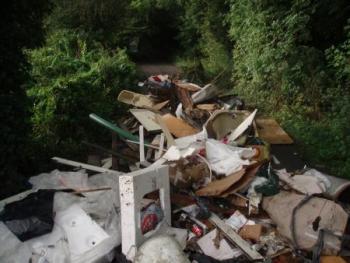
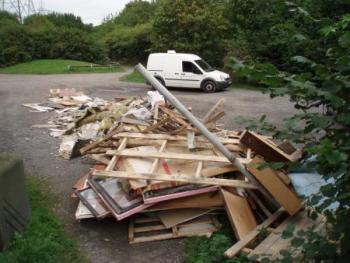
Help prevent fly-tipping
Ensure you know how a waste collector intends to dispose of your waste.
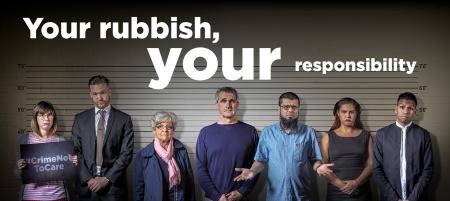
You should:
- ask if the person or company taking the waste away is a registered carrier
- ask to see copy of their registration certificate. Do not accept photocopies
- take a note of the name of the collector and the vehicle's details
- ask for a receipt
If you are in doubt about someone:
- check their details with the Environment Agency on 08708 50 65 06 and ask for an instant Waste Carrier Validation Check, or
- check online at the Environment Agency's website
If they are not registered, you must refuse the service.
If you are a business, additional legal requirements apply. You must describe the waste and document who takes it away, when and how. For more information see our waste management duty of care pages and guidance from HM Government.
A legitimate business person will not mind you asking questions of them. If a waste collector can’t or won't provide their name, business address or evidence of registration as a waste carrier, do not use them and report them to the Environment Agency or contact us with the information.
You will be committing a criminal offence if you do not check that anyone you pass waste onto is authorised by the Environment Agency to take it from you. The penalty for this offence is an unlimited fine in the magistrates’ court or in The Crown Court.
It is a good idea to keep a record of who took your waste away (such as their name, details of any vehicle used, and a note of the operator’s registration or permit number) and also to ask them for a receipt. This is just in case your waste ends up where it should not be.
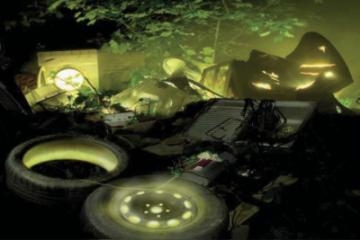
What you should do with unwanted items - don't let your rubbish come back to haunt you!
If you have waste or unwanted household items from your home to be disposed of:
- arrange for a bulky collection from the Council - telephone 0191 278 7878 or make the request online
- hire a skip for larger amounts of waste and DIY projects, but check first that the skip company is registered with the Environment Agency
- donate items that can be reused to local charity shops
- donate good quality unwanted furniture to organisations that can reuse them, such as the Newcastle Furniture Service or CT Furniture
- you can visit one of our Household Waste and Recycling Centres (HWRCs) with your household waste
Commercial or industrial waste may not be accepted at the HWRCs (this is because they are only licensed (permitted) to receive household waste). For more information on disposing of any trade waste, see the Government's guidance. This explains what you need to do and your duty to ensure that all trade waste is disposed of legally and without harming the environment.
Never leave waste or scrap metal on the street, verge or edge of your property for anyone to take away. If you do this you won’t know who takes it, what they'll do with it, or whether they're registered to transport it. A scrap metal dealer must by law keep records, including the name and address of the previous owner of the metal.
Do not decide to burn your waste at home. Burning waste, other than occasionally burning dry garden waste, would be a criminal offence.
Reasonable steps to take
To demonstrate you’ve met your duty of care, you could do the following:
- record any checks you make, including the operator’s registration, permit or exemption number
- keep a receipt for the transaction, which should include the business details of a registered operator
- ask for a copy or take a photograph of the carrier’s waste registration or, if you take waste directly to a disposal site, their permit
- record details of the business and of any vehicle used (registration, make, model, colour)
You should be wary of offers to take your waste away at a price significantly lower than other offers, where cash is the only accepted form of payment, or where a service can only be found or arranged through social media.
More information
More information is available from the National Fly-tipping Prevention Group’s guidance on how to prevent and deal with fly-tipping.
Council's responsibilities for dealing with fly-tipping are detailed at: Fly-tipping: council responsibilities - (www.gov.uk)
HM Government publishes a code of practice that provides practical guidance on how to meet your waste duty of care requirements. This duty applies to all producers, and other holders of waste.
For further help and guidance on the duty of care that applies to waste, see the Right Waste, Right Place website.
If you would like to give us feedback on our website, please complete this short online form.
